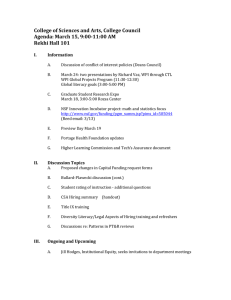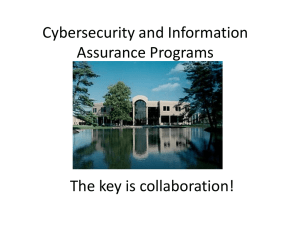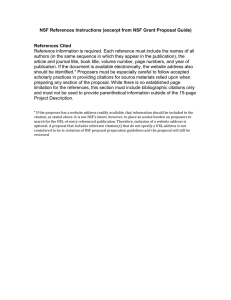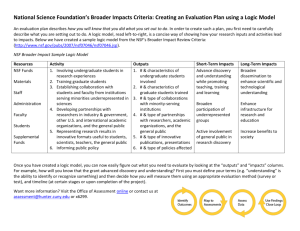Catalyzing Innovation in PV Manufacturing An NSF Workshop May 6-7 , 2010
advertisement
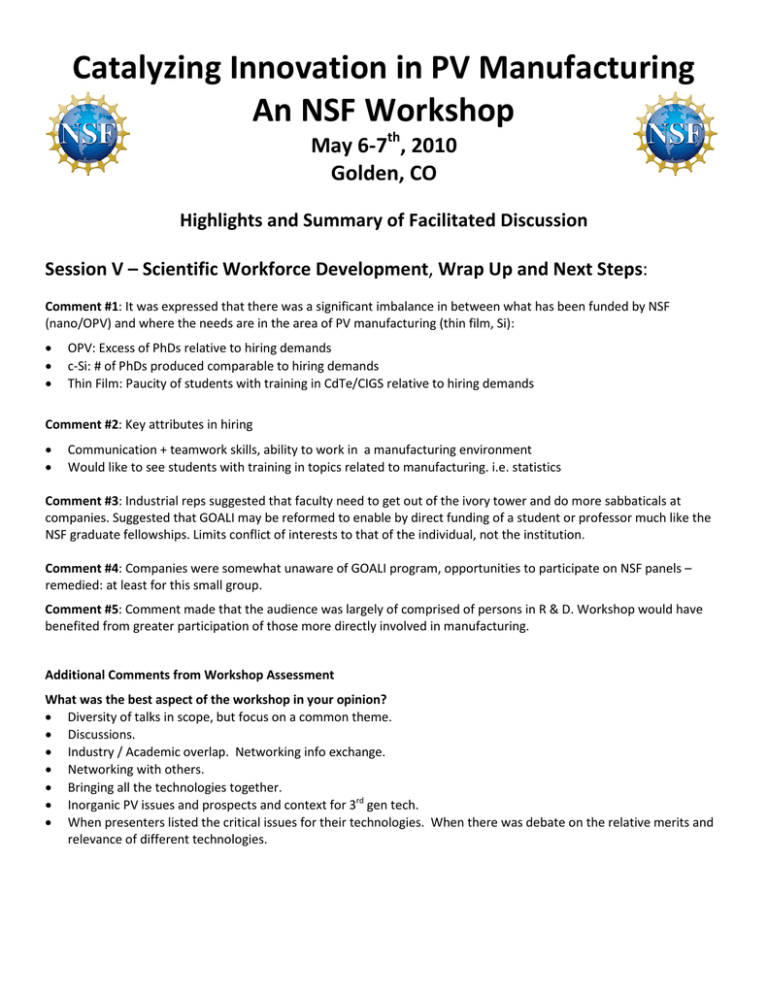
Catalyzing Innovation in PV Manufacturing An NSF Workshop May 6-7th, 2010 Golden, CO Highlights and Summary of Facilitated Discussion Session V – Scientific Workforce Development, Wrap Up and Next Steps: Comment #1: It was expressed that there was a significant imbalance in between what has been funded by NSF (nano/OPV) and where the needs are in the area of PV manufacturing (thin film, Si): • • • OPV: Excess of PhDs relative to hiring demands c-Si: # of PhDs produced comparable to hiring demands Thin Film: Paucity of students with training in CdTe/CIGS relative to hiring demands Comment #2: Key attributes in hiring • • Communication + teamwork skills, ability to work in a manufacturing environment Would like to see students with training in topics related to manufacturing. i.e. statistics Comment #3: Industrial reps suggested that faculty need to get out of the ivory tower and do more sabbaticals at companies. Suggested that GOALI may be reformed to enable by direct funding of a student or professor much like the NSF graduate fellowships. Limits conflict of interests to that of the individual, not the institution. Comment #4: Companies were somewhat unaware of GOALI program, opportunities to participate on NSF panels – remedied: at least for this small group. Comment #5: Comment made that the audience was largely of comprised of persons in R & D. Workshop would have benefited from greater participation of those more directly involved in manufacturing. Additional Comments from Workshop Assessment What was the best aspect of the workshop in your opinion? • Diversity of talks in scope, but focus on a common theme. • Discussions. • Industry / Academic overlap. Networking info exchange. • Networking with others. • Bringing all the technologies together. • Inorganic PV issues and prospects and context for 3rd gen tech. • When presenters listed the critical issues for their technologies. When there was debate on the relative merits and relevance of different technologies. Was there a particular topic(s) related to PV manufacturing that was inadequately addressed? • Focus primarily on conversion technologies. Tremendous opportunities in materials and components throughout supply chain that could have been addressed. • OPV/DSSC/alternate and enabling technologies. • Si (85% of market today), manufacturing • Equipment needs – manufacturing and metrology • How to get to TW production capacity in the US. • Organic prospects. • PV manufacturing equipment development, Si wafer based PV Additional feedback/Comments • There were several goals to conference. 1) how to catalyze innovation w NSF 2) how to keep American manufacturing. To address #2, NSF needs input from the corporate accountants (CFOs), CEOs and supply chain managers. It is these folks that take the manufacturing overseas (NOT the scientists!). We need policy and incentives (tax, financial) to keep PV manufacturing in the USA. • Not enough real discussion on manufacturing overseas. • Talks in general should have been tailored w/succinct recommendations for NSF. • TW/yr did not address too much beyond materials available. • A fringe area such as organic/DSC did not deserve the amount of time dedicated to it. Should have been more on crystalline Si. • Despite the title “Innovation in PV Manufacturing” there was relatively little input from the manufacturers who really understand the important issues. • Great organization. A little too intense….needs more networking functions. • Great Job.
